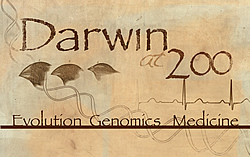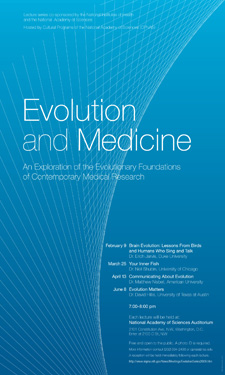NIH Evolution Revolution A Year-Long Celebration of Darwin’s Work & Impact
February 25 2009 10:07:23 AM
This activity will occur within the context of Take Your Child to Work Day at the National Institutes of Health. While animals may look very different from one another on the outside, their shared ancestry is apparent in their skeletal structures. Children participating in this event will have the chance to see evidence of common animal ancestry by comparing bones from different types of creatures. The activity will be led by NIH scientists knowledgeable about evolutionary biology.
Location: NIH Visitor’s Center, NIH campus, Bethesda, Maryland
For more information, contact: Irene Eckstrand, 301-594-0943
February 23 2009 03:37:30 PM
 This NIH Record story introduces some of evolution-themed events that will occur throughout the year at the National Institutes of Health in celebration of the Year of Science 2009. The NIH Record is a biweekly newsletter for NIH employees.
This NIH Record story introduces some of evolution-themed events that will occur throughout the year at the National Institutes of Health in celebration of the Year of Science 2009. The NIH Record is a biweekly newsletter for NIH employees.Online edition of article: http://nihrecord.od.nih.gov/newsletters/2009/02_06_2009/story3.htm
For more information, contact: Alisa Machalek, 301-496-7301
February 23 2009 03:33:34 PM
Evolutionary-themed lecture by a leading researcher in the field of bacterial communication. Title to be announced.

Time: 3:00-4:00 PM
Location: Masur Auditorium, Building 10, NIH Campus,
For more information, contact: Alisa Machalek, 301-496-7301
February 23 2009 02:07:15 PM
 This special, evolutionary-themed issue Findings celebrates the 200th anniversary of Charles Darwin’s birth and the 150th anniversary of the publication of his book On the Origin of Species by featuring the exciting work of two evolutionary biologists and short articles that highlight the role of evolution in medical research. Findings is a semi-annual magazine produced by the National Institute of General Medical Sciences that aims to put a human face on scientific research.
This special, evolutionary-themed issue Findings celebrates the 200th anniversary of Charles Darwin’s birth and the 150th anniversary of the publication of his book On the Origin of Species by featuring the exciting work of two evolutionary biologists and short articles that highlight the role of evolution in medical research. Findings is a semi-annual magazine produced by the National Institute of General Medical Sciences that aims to put a human face on scientific research.
Findings online: http://publications.nigms.nih.gov/findings/
For more information, contact: Alisa Machalek, 301-496-7301
February 23 2009 02:02:49 PM

In this special issue of Biomedical Beat, we highlight how the concept of evolution undergirds our understanding of antibiotic resistance, the rise of certain diseases and the way genes are regulated. Biomedical Beat is a monthly electronic newsletter produced by the National Institute of General Medical Sciences that focuses on new advances in basic biomedical research.
Online version of special issue: http://publications.nigms.nih.gov/biobeat/09-01-21/index.html
For more information, contact: Alisa Machalek, 301-496-7301
February 9 2009 01:02:38 PM
September 16 - October 28, 2009 (Wednesdays, times TBA), National Library of Medicine, Lister Hill Auditorium, Building 38A, first floor: "Motion Picture Evolution," a film series devoted to evolutionary movies and television programs. For over 100 years, filmmakers have imaginatively responded to the implications of evolutionary theory. This 7-week film series will show:
evolutionary monsters; evolutionary morality and bestiality; evolutionary degeneration, extinction and perfection; clashes between evolutionary theory and religious belief; human meddling with the "natural" course of evolution; and lots of scientists, dinosaurs, supermen and cavemen!
For more information: Michael Sappol, sappolm@mail.nih.gov, 301.594.0348.
October 1, 2009, National Library of Medicine, Lister Hill Auditorium, Bldg 38A, first floor: "Finished Proofs?," a symposium to celebrate the 150th anniversary of the publication of On the Origin of Species (1859). Leading historians and scientists will explore changing and contested understandings of Darwinian theory over the last 150 years.
For more information: David Cantor, cantord@mail.nih.gov, 301.402.8915.
February 9 2009 01:00:49 PM
On February 12, 1809, Charles Darwin was born in Shrewsbury, England. Fifty years later, on November 22, 1859, Darwin's On the Origin of Species, one of the most influential scientific books ever written, went on sale to the public.
Radical in sweep, Darwin's theory of naturally innovating and endlessly changing webs of life laid bare the deep connections within the living world.
Darwin rewrote the book of nature and forced us to rethink humankind's own place within it. One hundred and 50 years later, we still struggle to comprehend the world that Darwin made.
To mark the 200th anniversary of Darwin's birth and the 150th anniversary of the publication of his groundbreaking work, the National Library of Medicine, in collaboration with the Office of NIH History, presents a small exhibition, "Rewriting the Book of Nature: Charles Darwin & the Rise of Evolutionary Theory." The public is invited to this thought-provoking display, which includes a rare first edition of "On the Origin of Species" and other important books by Darwin, Darwin photos and letters, and works by the great naturalist's predecessors, contemporaries and successors.
The exhibition, inside and outside the NLM History of Medicine Division Reading Room, Building 38, first floor, runs from February 9 to July 2, 2009 and from September 3 to December 31, 2009. All are welcome to visit, 8:30 AM to 5:00 PM weekdays, except federal holidays.
Directions, security, parking, etc.:
http://www.nlm.nih.gov/hmd/about/visitus.html.
For more information: Michael Sappol, sappolm@mail.nih.gov, 301.594.0348.
Individuals who need Sign Language Interpreters and/or reasonable accommodation for their visit should contact Melanie Modlin, mm354i@nih.gov, 301.496.7771.
January 28 2009 07:46:23 AM
Sponsored by The Ballston Science and Technology Alliance
Date: February 3, 2009
Time: 6:00 pm to 8:00 pm
Location: The Front Page Restaurant, 4201 Wilson Blvd., Arlington, VA
Fee: $6; includes all-you-can-eat buffet
As every school child knows, Charles Darwin (and Alfred Russell Wallace) provided a provocative explanation for many of the regularities, which were well known characteristics of the fossil record. The explanation: evolution by natural (and sexual) selection. What school children and probably most adults don’t know is that Darwin, long before release of “On the Origin of Species,” was focused as much on the behavior of species as on the bodily plan forms that were found in the fossil record. In fact, close reading of Darwin’s writings show his profound fascination with behavior, and this included the behavior of the only species capable of generating his theory—humans. Thus, as we celebrate Darwin’s 200th birthday and the nearly 140th anniversary of his “The Descent of Man, and Selection in Relation to Sex", Café Scientifique will consider Darwin’s theory as it applies to human beings.
Hear from Dr. Dennis K. McBride  , the Academic President of the Potomac Institute for Policy Studies, headquartered in Arlington, VA. He is also an active adjunct professor at Georgetown University’s Medical School and its Public Policy Institute. McBride has written, spoken and debated widely on evolutionary psychology.
, the Academic President of the Potomac Institute for Policy Studies, headquartered in Arlington, VA. He is also an active adjunct professor at Georgetown University’s Medical School and its Public Policy Institute. McBride has written, spoken and debated widely on evolutionary psychology.
For more information, send an email to: kbreen@arlingtonva.us
Online registration can be found at:
http://www.arlingtonvirginiausa.com/registration_forms/event_detail_web2lead.cfm?event_ID=4641 
January 16 2009 02:00:21 PM
The NIH Clinical Center is featuring photographs of the Galapagos Islands in an exhibit running now through February 26, 2008. Photos of the island where Darwin conducted essential fieldwork, with its unique and diverse flora and fauna, were submitted by NIH employees and patients, as well as photographers from the community. NHGRI Scientific Director Eric Green, M.D., Ph.D. is among the NIH photographers whose work is on display in the East Gallery and East Alcove Gallery on the first floor of the Mark O. Hatfield Clinical Research Center, NIH Campus, Bethesda, MD.
Directions to the NIH Clinical Center
http://www.cc.nih.gov/about/visitor/dir_to.shtml
January 16 2009 12:46:38 PM
 February 12, 2009, marks the 200th birthday of Charles Darwin (1809-1882) and the 150th year since publication of his seminal work, On the Origin of Species. The renowned 19th century naturalist made observations on plant and animal life that set science on a new course, introducing evolution as the unifying concept in all of genetics and biology. Students of U.S. history will note that the date is also the 200th birthday of U.S. President Abraham Lincoln.
February 12, 2009, marks the 200th birthday of Charles Darwin (1809-1882) and the 150th year since publication of his seminal work, On the Origin of Species. The renowned 19th century naturalist made observations on plant and animal life that set science on a new course, introducing evolution as the unifying concept in all of genetics and biology. Students of U.S. history will note that the date is also the 200th birthday of U.S. President Abraham Lincoln.The National Human Genome Research Institute (NHGRI) will observe Darwin's life and accomplishments at events at the NIH's Bethesda campus and at the Smithsonian Institution's National Museum of Natural History.
NIH Symposium
Darwin at 200: Evolution, Genomics, Medicine is a symposium celebrating the 200th anniversary of the birth of Charles Darwin and is scheduled from 8:30 a.m. - 12:30 p.m., Thursday, Feb. 12, 2008. Speakers will include NHGRI Acting Director Alan Guttmacher, M.D., and Scientific Director Eric Green, M.D., Ph.D., among other celebrated researchers from across the country. The symposium will be held at Masur Auditorium, NIH Campus, Bethesda, Md. (See: DIR Calendar)
Public and High School Program
The Darwin @ 200 Anniversary Celebration is a program offered by NHGRI and the Smithsonian Institution's National Museum of Natural History. High school students from the Washington metropolitan region will gather for a program featuring a distinguished panel of speakers on a variety of topics, from historical perspectives of Darwin, to evolution and medicine.
Among the featured speakers are paleoanthropologist Donald C. Johanson, who discovered fossils of early hominid species, including the skeleton of a 3.5 million-year-old female hominid, known as Lucy.
Speakers from NHGRI will include Acting Director Alan Guttmacher, M.D. and Former Director Francis Collins, M.D., Ph.D. The program will be 12 - 3 p.m. at the Baird Auditorium, National Museum of Natural History, located at the intersection of 10th Street and Constitution Avenue, NW, Washington, D.C. Seating is limited, but the event is open to the public. If you are interested in attending, please call 301-594-1364.
January 16 2009 12:42:34 PM
 NIH is partnering with the National Academy of Sciences to present the annual lecture series, Evolution and Medicine. An outstanding group of scientists will present lectures on evolution as it applies to their area of scientific expertise. A reception will be held immediately following each lecture. The program is free and open to everyone.
NIH is partnering with the National Academy of Sciences to present the annual lecture series, Evolution and Medicine. An outstanding group of scientists will present lectures on evolution as it applies to their area of scientific expertise. A reception will be held immediately following each lecture. The program is free and open to everyone.
All lectures take place from 7:00 pm – 8:00 pm at the National Academy of Sciences Auditorium, 2101 Constitution Ave., N.W., Washington, D.C. Enter at 2100 C St., N.W. A photo ID is required for entrance. For more program information contact (202) 334-2436 or cpnas@nas.edu. American Sign Language (ASL) interpreters will be available upon request. If you require this or other reasonable accommodations to participate in this activity, please contact OSE at least 5 days prior to the event at (E-mail) moorec@mail.nih.gov, (Voice) 301-402-2470, or the Federal Relay, (TTY) 1-800-877-8339.
Brain Evolution: Lessons From Birds and Humans Who Sing and Talk
February 9, 2009
Erick Jarvis, Duke University
Videocast: http://videocast.nih.gov/ram/evmed020909.ram
Your Inner Fish
March 25, 2009
Neil Shubin, University of Chicago
Videocast: http://videocast.nih.gov/ram/evmed032509.ram
Communicating About Evolution
April 13, 2009
Matthew Nisbet, American University
Evolution Matters
June 8, 2009
Dr. David Hillis, University of Texas
Evolution and Medicine Lecture Series Archives
http://science.education.nih.gov/home2.nsf/Educational+Resources/Topics/Evolution/CCA1A19ECF07271C8525716A00597219







